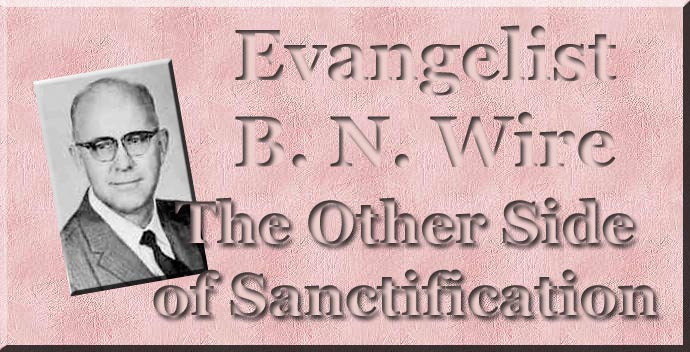
The Other Side Of Sanctification
By Evangelist B. N. Wire
Chapter 6
What Is The Difference Between Sins and Mistakes?The very common and dangerous teaching of a "sinning religion" held by some church groups is many times due to a failure to distinguish between mistakes and sins. Everyone knows that it is impossible for any human to keep to the full the perfect and holy law of God. Therefore, if every transgression against the perfect law of God is sin, then we must have a "sinning Christianity" to have any at all. However, the Bible is clear at this point and it is very disastrous for any to teach a doctrine that tries to reconcile sinning with Christian living. When people do not believe that they can or are expected to live without sin they will tend to excuse sin in themselves and others, and live less carefully. The scripture teaches plainly that many mistakes and imperfections are compatible with holy living, whereas sin incurs guilt and always throws the soul out of fellowship with God. There is no such creature as a "sinning Christian" any more than there is a "sainted Devil" for "He that sinneth is of the Devil." I John 3:8. It is so far from being impossible to live without sin that God demands that the sinner cease his sinning before he can be pardoned. "Let the wicked forsake his way and the unrighteous man his thoughts and let him return unto the Lord and He will have mercy and He will abundantly pardon." Isaiah 5 5:7. Every Christian is promised cleansing from all sin if he will walk in the light. I John 1:7. Every Christian is also commanded to be made perfect in love. But, no where does it infer that this state of perfect love and cleansing from all sin included or means absolute, intellectual, physical, Adamic or angelic perfection. It does not mean freedom from errors due to imperfect knowledge and wisdom. The six cities of refuge in the Old Testament clearly testify to the attitude of God toward unwitting transgressions against His law. Joshua 20:3. God emphasizes that it is the motive that prompts the act that determines its morality. "And if the avenger of blood pursue after him, then they shall not deliver the slayer up into his hand; because he smote his neighbor unwittingly, and hated him not before time." Joshua 20:5. An unwitting transgression of God's law is compatible with holiness of heart and incurs no guilt upon the soul of man. As long as we are limited in knowledge and imperfect in judgment and wisdom we can never be saved from making mistakes. Ignorance and fallibility of the human intellect cause all - even the holiest men - to do unwise and hurtful things although their motives are perfectly holy. All of us will have to keep the two hardest words to pronounce" forgive me" or "I am sorry" - on our lips all the journey of this mortal existence. We will do the wrong thing ignorantly many times and perhaps cause others to stumble and do more harm than good. The test of our holiness and heart motive is our perfect willingness to confess our faults, acknowledge our blunders, and learn our lessons from such mistakes. We cannot hope to be free from mistakes, but we can and must be saved from all sin. Sin is a thing of the heart whereas a mistake is a thing of the head. A sin is something you do when you know better, while a mistake is something you do when you do not know better. For the sake of encouraging faith in victorious Christian living we must not term sin any act which is not imputed to man bringing guilt upon his soul and separating him from the favor of God. God is angry with the sinner everyday; but He is our refuge and strength, comfort and joy. He smiles upon us and delights in us if we are doing all we know to be in His holy will. |
|
 |
 |
|
|
|
-
Site Navigation
 Home
Home What's New
What's New Bible
Bible Photos
Photos Hiking
Hiking E-Books
E-Books Genealogy
Genealogy Profile
Free Plug-ins You May Need
Profile
Free Plug-ins You May Need
 Get Java
Get Java.png) Get Flash
Get Flash Get 7-Zip
Get 7-Zip Get Acrobat Reader
Get Acrobat Reader Get TheWORD
Get TheWORD